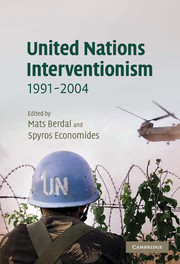Preface
Published online by Cambridge University Press: 22 September 2009
Summary
The original edition of this volume, The New Interventionism, 1991–1994, published in 1996 and edited by James Mayall, offered an initial assessment of the United Nation's (UN) interventions in the immediate post-Cold War. The volume concentrated on three case studies; Cambodia, former Yugoslavia and Somalia and included extensive chronologies, and the relevant Security Council Resolutions for each case, in several appendices.
In this volume we develop the debates on UN intervention post-1990 by updating the original three case studies and adding to them five more: Rwanda, Haiti, East Timor, Kosovo and Sierra Leone. In each case, the causes and consequences of UN intervention are examined in the context of the history of each specific crisis, as well as against the backdrop of wider changes – of both a normative and geopolitical kind – in international relations. The case selection is primarily driven by the extent of UN intervention and the significance of the UN experience in these crises for the functioning of the organisation and its international standing, as well as by their chronological and geographical scope.
As stated by James Mayall in the Introduction, this volume concentrates on the ‘prospects for international cooperation, the preconditions for success, the causes of failure, and the constraints that must be overcome if the UN Charter is to act as a constitution for international society, rather than as a mere list of lofty but unattainable principles’.
- Type
- Chapter
- Information
- United Nations Interventionism, 1991–2004 , pp. ix - xPublisher: Cambridge University PressPrint publication year: 2007

